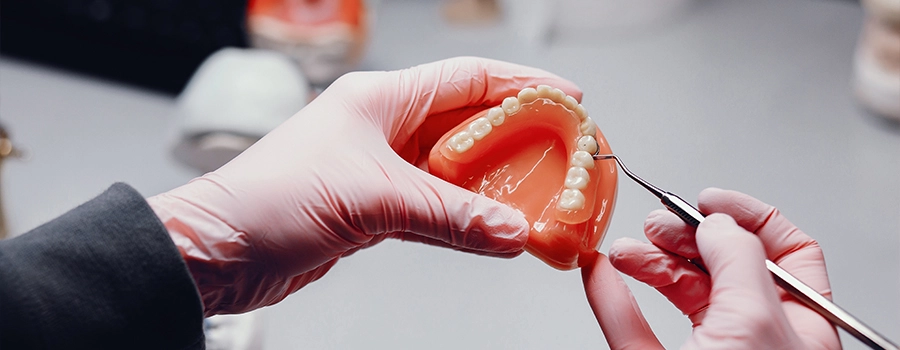The healthier your oral health, the more confident you’ll feel. For example, if your teeth look flawless, you’ll smile more than ever. If you have problematic teeth, you may hesitate to smile in public. Fortunately, there’s no need to worry anymore! You can say goodbye to such problems with dental prostheses.
A dental prosthesis is a device manufactured to replace missing teeth and restore a pleasing appearance to dental defects. Examples of prostheses include dental implants, bridges, crowns, and veneers. Some of these products are removable, while others are permanently fixed to your teeth.
Many patients with gum or tooth issues may turn to prosthetic dentistry. So, what are the benefits of this treatment and how much can you expect to spend? In this article, you’ll find answers to all your questions.
What Is the Purpose of a Dental Prosthesis?
When minor issues affect your teeth, you can see a general dentist for help. However, for lost or severely damaged teeth, you should consult a prosthodontist. Just as you might use a prosthetic limb to replace a missing arm or leg, you can use a dental prosthesis to replace or support your teeth.
What Types of Dental Prostheses Are There?
If you’ve lost one or more teeth, or your teeth are damaged beyond repair with conventional treatments, you need a dental prosthesis. After evaluating your case, your specialist will replace the gap with a suitable prosthesis or use one to support your natural teeth.
Even with the same diagnosis, not every patient receives the same treatment, so there are different prosthesis options, including:
- Dental Implants: Replace a missing tooth with an implant. Implants act like tooth roots and support a crown. There are various implant types depending on the location in the mouth; your specialist will choose the best option for you.
- Crowns: If your teeth are severely damaged, your dentist may recommend a crown. Crowns are typically made of porcelain, offering a natural-looking, durable restoration.
- Bridges: If one or more teeth are missing, you can use a bridge that spans the gap and resembles natural teeth.
- Veneers: Often used on front teeth, veneers cover discoloration and minor defects for an improved appearance.
- Full or Partial Dentures: Made of an acrylic base and artificial teeth, dentures can be removable or attached to implants for stability.
How Is a Dental Prosthesis Made?

The procedure for creating a prosthesis follows steps similar to other dental restorations. After confirming you’re a candidate for a prosthesis, your dentist will proceed as follows:
1. Planning: Your dentist conducts a thorough consultation, including X-rays to assess your jaw and tooth anatomy. If no contraindications are found, the process moves on.2. Laboratory Preparation: Impressions or digital scans of your teeth and gums are taken and sent to a lab. Depending on the clinic, this may occur at your first visit.3. Surgical/Operative Phase: Local anesthesia is administered, and the prosthesis—temporary or permanent—is placed.
Once all steps are complete, you can start enjoying your new smile. It’s normal to experience mild discomfort right afterward, but this is temporary. If pain persists beyond two weeks, revisit your dentist.
Cleaning and Caring for Prosthetic Teeth
Maintaining prosthetic teeth is as important as caring for natural teeth. Poor hygiene can lead to bacterial plaque buildup and gum disease.
After every meal, clean your prosthesis. First, determine if your prosthesis is fixed or removable:
- Fixed Prostheses: Brush at least twice a day and use floss or interdental brushes to remove plaque.
- Removable Prostheses: Rinse them under water after removal and soak them overnight in plain water (a special solution isn’t required). You can also use storage containers sold in pharmacies.
How Much Do Prosthetic Teeth Cost?
Costs vary widely based on materials used and the number of teeth being replaced. Because each treatment plan is personalized, it’s impossible to quote a fixed price here. Contact us to schedule a consultation and receive an accurate cost estimate.
Frequently Asked Questions
Who Is a Candidate for Dental Prostheses?
Anyone missing one or more natural teeth may be a candidate for a dental prosthesis.
Should I Choose an Implant or a Denture?
Implants and dentures serve similar purposes. Your dentist will recommend the best option based on your individual needs. In some cases, implants are preferable; in others, dentures may be more appropriate.
How Long Do Dental Prostheses Last?
Prostheses typically last 5–10 years. Worn or damaged teeth can be replaced over time.
Is Getting a Dental Prosthesis Painful?
Local anesthesia ensures you won’t feel pain during placement. You may experience mild soreness afterward, which can be managed with prescribed pain relievers.
Can You Brush a Dental Prosthesis?
Yes. Fixed prostheses should be brushed twice daily. Removable prostheses should be rinsed and stored in water when not in use.


















































